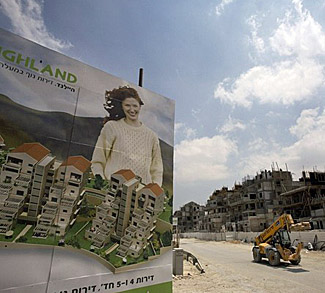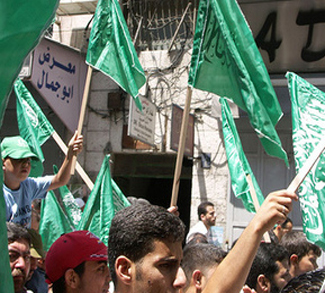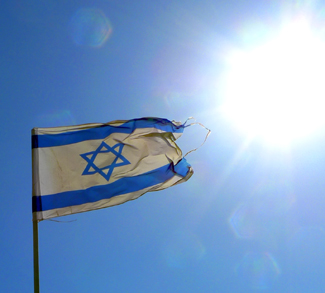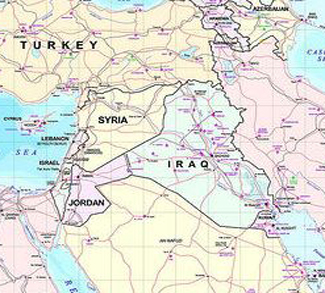FORECAST
The moment that Secretary Clinton praised an Israeli proposal to temporarily restrict settlement construction in the West Bank as an ‘unprecedented concession,’ sighs of disappointment could be heard ringing out from Arab capitals around the world. It appears that the Middle East peace process will soon be back to business as usual.
Abandoning the demand for a hard settlement freeze contrasts starkly with America’s stance of six months ago. President Obama came to power in 2008 with an eye on mending America’s strained relationship with the Muslim world. Consequently, President Obama’s special envoy, George Mitchell, poured pressure on the Netanyahu government to implement the settlement freeze envisioned in the 2003 Road Map agreement. The rare hard-line position on the part of the Americans was welcomed on the Palestinian side, which also held up a full freeze as a precondition for resuming negotiations.
Fast-forward to the present and everything has changed. Secretary Clinton shocked more than a few people last week when she proclaimed that the Palestinian demand was a ‘precondition obstructing the peace process.’ When met with a flurry of anger over the American about-face, Secretary Clinton stressed that President Obama still views the settlements built in occupied territories as illegitimate. It seems that in the eyes of the Obama administration, they’re just not important enough to perpetually stall the peace process.
It was always going to be difficult for Washington to convince the Muslim world that it was not squarely in the Israeli camp, and this U-turn has certainly made it even tougher. The burning question is: Why now?
It could be the result of a behind-the-scenes deal on Iran. President Obama may have offered up a softened stance on settlements as an apparently minute concession to buy some time on pushing the diplomatic track, and in doing so completely misjudged the issue’s symbolic importance to the Muslim world.
Alternatively, the decision may have come as a result of domestic political factors. President Obama has weathered a healthcare revolt, a crisis with Afghanistan policy, and more recently two gubernatorial defeats. He is losing much of his political sheen, and whereas the Israel lobby may have stood back during his tough talk on settlements last May, the pressure they can bring to bear is potentially more persuasive now.
The shift on settlements could also simply be meant to re-align Washington with the Israeli position in anticipation of an eventual UN Security Council veto on further Goldstone Report investigations.
Whatever the motivations, this policy shift will have the unfortunate result of killing off any hope of the peace process moving forward in the immediate future. Already, the Palestinian Authority (PA) President Mahmoud Abbas has come out and said that he “insists on not running,” for re-election next January. A source within Fatah went so far as to describe Mr. Abbas as “broken.” There are no credible candidates waiting in the wings behind Mr. Abbas, meaning that his departure risks a power vacuum forming within Fatah.
With no credible partner at the head of the PA, and Hamas still regarded as an international pariah, the peace process will remain stalled. Barring the emergence of a charismatic leader who can command enough respect to muscle open some room to negotiate, it will be years, not months, until any positive forward steps are made.
SUMMARY OF EVENTS: November 2 – 9, 2009
WORLD
The dollar slid against high-yielding currencies Monday, led by the Australian dollar, as China reported a surge in manufacturing and investors bet factory production in the U.S. accelerated. Oil, copper and gold climbed.
Gold prices defied a stronger dollar and are at new all-time highs Tuesday, with the spot market touching $1,081.05 a troy ounce as speculative interest in the precious metal recovers.
The world’s top financial officials on Friday sought a blueprint for securing future global growth and worked to break a deadlock over who bears the cost of fighting climate change.
NORTH AMERICA
United States
A delegation of senior U.S. officials, pursuing a new dialogue, met with Myanmar’s military rulers on Tuesday in the highest-level talks with the reclusive junta in 14 years.
The U.S. Federal Reserve said on Wednesday that the U.S. economic activity has continued to “pick up,” and decided to keep a key interest rate unchanged at a record low of between zero to 0.25 percent to prop up the economy.
In an attempt to defuse Arab anger over her pro-Israeli remarks, the U.S. secretary of state said Washington does not accept the legitimacy of Israeli settlement activities on Palestinian territories.
The Pentagon’s Office of Inspector General is conducting a new investigation into a covert Bush administration Defense Department program that used retired military analysts to produce positive wartime news coverage.
An army psychiatrist about to be sent to Iraq gunned down 13 people and wounded 30 in a rampage on a huge Texas military base but survived after being shot four times himself.
CENTRAL AMERICA & THE CARIBBEAN
Honduras
Ousted Honduran President Manuel Zelaya said he will refuse support to the country’s reconciliation government if he is not be reinstated ahead of national elections next month, the EFE news agency reported on Monday.
Honduras sunk into further disarray after President Manuel Zelaya, ousted in a military-backed coup, said a US-brokered deal to end the nation’s four-month crisis had collapsed.
SOUTH AMERICA
Paraguay
President Fernando Lugo sacked the head of Paraguay’s armed forces on Friday, two days after firing a trio of top military commanders amid rumors of a potential coup, government sources said.
Venezuela
A new military cooperation agreement between Colombia and the United States is “a shame for the history of our continent,” Spain’s news agency EFE quoted the Venezuelan foreign minister as saying Tuesday.
WESTERN EUROPE
A joint French-British UN initiative would call on Israel and the Palestinians to hold immediate, independent investigations into war crimes allegations stemming from the war in Gaza, as part of a bid to send the Goldstone report back to Geneva and out of the hands of the Security Council or the International Criminal Court at The Hague.
Britain
The British government announced Tuesday that it will break up parts of major financial institutions bailed out by taxpayers, highlighting a growing divide across the Atlantic over how to deal with the massive banks that were partially nationalized during the height of the financial crisis.
British mercenary Simon Mann, who was sentenced in July last year after he admitted taking part in a coup to overthrow President Teodoro Obiang, has received a presidential pardon.
Italy
In a landmark ruling, an Italian judge on Wednesday convicted a base chief for the Central Intelligence Agency and 22 other American CIA operatives of kidnapping a Muslim cleric from the streets of Milan in 2003.
EASTERN EUROPE
Poland
Warsaw denied on Friday Russian media reports that Polish Foreign Minister Radoslaw Sikorski asked Washington to deploy U.S. troops to protect Poland from potential attacks from Russia.
MIDDLE EAST
The UN General Assembly enjoined Israel and the Palestinians to probe war crimes allegedly committed in Gaza nearly a year ago, a move which the Jewish state said would hurt the quest for Middle East peace.
Iran
Iran wants more talks on a UN-drafted nuclear deal and to import atomic fuel rather than send its own uranium abroad for processing, a Iranian diplomat said, suggesting terms world powers are likely to rebuff.
Iran’s ambassador to Moscow Seyed Mahmoud Reza Sajjadi said Tuesday that Russians will launch Iran’s Bushehr nuclear power plant soon, the semi-official Fars news agency reported.
Tens of thousands of Iranians held demonstrations on Wednesday across the country to mark the 30th anniversary of the seizure of the U.S. embassy in Tehran by Iranian students.
UN inspectors found “nothing to be worried about” in a first look at a previously secret uranium enrichment site in Iran last month, the International Atomic Energy chief said in remarks published Thursday.
Two Iranian businessmen working at a Dubai-based firm were linked to video surveillance devices sold to Sudan and used in unmanned drones in Darfur in violation of a UN arms embargo, a U.N. report said.
Iraq
The British oil giant BP will today take control of Iraq’s biggest oilfield in the first important energy deal since the 2003 invasion.
An ExxonMobil-led consortium has beaten rival Russian, French and Chinese groups to bag initial rights to develop Iraq’s West Qurna field, the Oil Ministry said Friday, adding momentum to Iraq’s bid to unlock its oil riches.
Israel
Israel’s navy has intercepted a ship carrying hundreds of tonnes of Iranian weapons intended for Hezbollah in Lebanon, the Israeli military has said.
Lebanon
Lebanon’s Hezbollah guerrilla group denied on Thursday any connection with a shipment of weapons that Israel said it had intercepted on the high seas.
Palestinian Territories
The Palestinian president, Mahmoud Abbas, warned on Thursday that he would not seek re-election, the latest sign that the Obama administration’s drive to broker a Middle East peace accord, one of President Obama’s key foreign policy goals, has fallen into disarray.
Saudi Arabia
Saudi authorities have discovered a large arms cache in Riyadh linked to 44 militants whose arrest was announced in August, state television said on Sunday.
Saudi jets pounded Shiite rebel camps inside Yemen on Thursday and ground troops could move across the border against them after they killed a Saudi border guard, an informed Saudi source told AFP.
EAST ASIA
China
Chinese forces have launched a “strike hard” security campaign in the restless far western region of Xinjiang, vowing to wipe out lawlessness and “change the face” of the public security situation there.
SOUTH ASIA
Afghanistan
Hamid Karzai has been re-elected as Afghanistan’s president after a run-off vote was canceled, but he faced stern warnings he will have to work harder to retain the West’s support after a flawed electoral process.
Afghan President Hamid Karzai called on Taliban militants to lay down arms and join the peace process in his first press conference on Tuesday after winning the presidential polls.
The killing of five British troops by a rogue Afghan policeman underlines concerns about training and discipline within the ranks and possible insurgent infiltration of a police force that the U.S. hopes will be its ticket out of Afghanistan someday.
Technocrats and some existing ministers will be appointed to Afghan President Hamid Karzai’s new government, a spokesman said on Wednesday, but his main rival branded his re-election illegal and ruled out taking any part.
The United Nations said on Thursday it would evacuate hundreds of its international staff from Afghanistan for several weeks due to deteriorating security, a sharp blow for Western efforts to stabilize the country.
Pakistan
Pakistani forces say they have seized control of the town of Kaniguram in South Waziristan, one of the Taliban’s key regional strongholds.
AFRICA
Sudan
Election observers expressed concern on Tuesday over the harassment of political parties and funding delays as voters began to register for Sudan’s first multi-party elections in 24 years.
Zimbabwe
Zimbabwe’s Prime Minister Morgan Tsvangirai on Thursday said he had called off a boycott of power-sharing ties with President Robert Mugabe that had paralysed the fragile unity government for three weeks.
Zimbabwe’s government has proposed that “indigenous Zimbabweans” take 51 percent ownership of all foreign companies, including mines and banks, according to a draft law seen by Reuters Friday.




